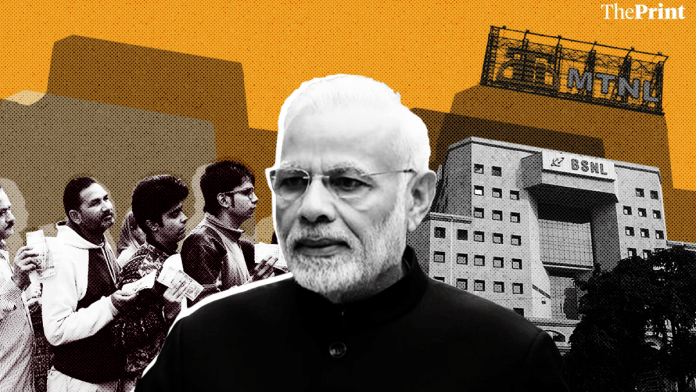The Narendra Modi government is contemplating a Rs 74,000 crore bailout plan for state-owned telecommunication companies BSNL and MTNL. BSNL is the country’s largest loss-making PSU at Rs 13,804 crore, while MTNL is the third, at a loss of Rs 3,398 crore.
ThePrint asks: Modi govt considers bailing out BSNL, MTNL: Wise to waste taxpayers’ money on sinking PSUs?
Reviving loss-making PSUs by infusing taxpayers’ money seems to be a fiscally imprudent move
 Radhika Pandey
Radhika Pandey
Economist, NIPFP
The government is considering a Rs 74,000-crore bailout plan to revive the BSNL and the MTNL. The strategy to revive loss-making PSUs by infusing taxpayers’ money seems to be a fiscally imprudent move. At a time when the government is following an aggressive disinvestment strategy to mop up additional revenue to finance infrastructure and welfare schemes, the proposal to infuse Rs 74,000 crore to revive the ailing MTNL and BSNL is questionable.
Any strategy to restructure ailing PSUs is a painful and long-term process, but some bold decisions need to be taken. The decision to use taxpayers’ money should be accompanied by a commitment to initiate holistic reforms to promote efficiency and competition. In the absence of this commitment, a bailout package simply sets the stage for another round of inefficiency and higher costs.
While the decision to revive the MTNL and the BSNL has come too late, it should prompt policy-makers to initiate restructuring packages when the PSU starts showing early signs of trouble. A range of options – from strategic sales, privatisation, liquidation to monetisation of locked assets – need to be considered.
On the fiscal front, the move will create additional difficulties for the government. While the headline fiscal deficit was pegged at 3.4 per cent in the interim budget, taking into account the off-budget liabilities, the actual fiscal deficit could be much higher. While spending commitments are huge, tax revenues have been less than anticipated. In this backdrop, the decision to spend an additional Rs 74,000 crore appears to be contentious.
Views are personal.
Also read: Starting with BSNL & MTNL, India’s new govt must bring bankruptcy process to public sector
BSNL has valuable assets and infrastructure – there is a case for govt support
 Mahesh Uppal
Mahesh Uppal
Telecommunication Regulation Consultant
I believe the answer is not as simple. There is a case to support these companies, but they should come with key conditions. The government must be willing to allow better quality management and more importantly, let BSNL and MTNL get on with its work uninterrupted.
The government should not just be willing but insist on bringing a new commercially-driven partner who can quickly upgrade its infrastructure and services to levels that the market expects from a key nationwide player. I think BSNL has valuable assets and infrastructure.
It’s access across the country is something its competitors would kill for. There is every reason to have a public sector player in a key area of the economy. It could provide an alternative in a wide range of situations where private players may be difficult to manage. The sector and the consumers don’t need just competition between private players. They need competition between private and public players as well as between technologies, business models, wireline, cellular and satellite services too.
Government has adopted discriminatory policy against BSNL, which favours private operators
 P. Abhimanyu
P. Abhimanyu
General Secretary, BSNL Employees Union
While the government is now considering a bailout, it is the government which killed the BSNL in the first place. The bailout is just a way to prepare the ground for privatisation of the BSNL. We are a 100 per cent government-controlled company and that’s why our internal functioning has always faced government interference.
We have not been allowed a level-playing field. The government has adopted a discriminatory policy against BSNL, which favours private operators.
Other private companies such as Vodafone-Idea, Airtel and even Reliance have high debts, yet it is the BSNL that is chastised.
Taking quick loans for any capital expenditure is extremely difficult as prior approval is required from the DoT, which usually takes a lot of time. Between 2006 and 2012, the government did not allow any procurement of equipment and all tenders floated by the BSNL were cancelled. We had announced a tender for supplying mobile equipment to roll out 45 million lines, which was cancelled.
At a time when 5G is knocking on our doors and all private operators have switched to 4G, the BSNL has not been allotted even a 4G spectrum.
For revenue generation, the BSNL needs to expand its network, and this requires capital infusion and upgradation of technology – the government has not helped the BSNL in these two areas.
Also read: BSNL employees get February salary but their woes aren’t over, blame Modi govt for cash crunch
 Piecemeal financing won’t work, government needs proper strategy to revive BSNL & MTNL
Piecemeal financing won’t work, government needs proper strategy to revive BSNL & MTNL
Manoj Gairola
Telecom Analyst
The government is not pumping in Rs 74,000 crore in BSNL and MTNL. What it has proposed is giving 4G worth Rs 20,000 crore to BSNL free of cost and Rs 13,000 crore for rolling out its network. Rest is for voluntary retirement scheme of employees.
Now, compare it with its competitors Reliance Jio and Airtel. Reliance has invested more than Rs 300,000 crore in Jio, while Airtel promoters have invested crores to upgrade their network to 4G.
The government, which is the owner of BSNL and MTNL, has not made any substantial investment in the two companies for a while. The companies have had to dip into their own cash reserves. For the last three months, BSNL has stopped payment to its vendors. Consequently, a large part of its network is down. MTNL is almost a dead network. In any case, MTNL and BSNL have mostly 2G customers.
Rolling out 4G will take at least two years. By that time, BSNL will become sick. It is already staring at a loss of Rs 10,000 crore at a revenue of Rs 20,000 crore.
If the government has to revive BSNL and MTNL, it will have to make a proper strategy. Otherwise, any financial support given to it in piecemeal will be wastage of taxpayers’ money.
By Fatima Khan, Revathi Krishnan and Mahua Venkatesh.







When Pvt operator are taking lakhs of crore loan and then closing the business like Rcom,did any body question about their Loan?During Last 19 years BSNL has given more than 70000cr to govt as tax,licence fee ,Incometax and got the burdern of 4 lakhs employees from the govt…Person who are telling that govt is using Taxpayer money in BSNL should analysed properly before giving such statement.
BSNL MTNL overburdened mostly by it’s own age-old, unprofessional , unproductive & non-technical staff ,& they are paid hectic salaries for simply playing cards, chit chatting and smoking beedies. Judiciously , essential staff should be retained and unwanted staff may be sent with VRS. Right,really efficient, capable staff should be promoted and rewarded irrespective of reservation. The company must cultivate corporate culture and carry out businesses.
But who will tie bell to the cat ?
Not many might remember that MTNL and BSNL trade unions (along with all the Marxist parties) argued against any mobile network. They said that mobile phones would only benefit the rich and the poor could never afford them. Instead, they wanted to stay with land lines where it took years and lost of bribes to just get a telephone number. Today the vast majority of BSNL/MTNL revenue goes to pay employee salary and there are 10 times the number of employees than actually needed. For decades, groups of people like this have wasted enormous amounts of public money while keeping India from progressing forward.
DHFL, IL&FS को टैक्स पेयर्स का पैसे दिए जाते है तो ये लोगो का मुह में ताला लग जाता है। PSU कंपनी देश के विकास में अपना योगदान देते है। प्राइवेट कंपनी नही
100%right..No one is raising question when pvt company are getting benifits..
Consider how much good can be done by spending an additional 74,000 crores on India’s underfunded public healthcare system. How many poor children would benefit if hospitals in places like Muzaffarpur and Gorakhpur had more and better trained doctors and nurses, there was a sufficient stock of medicines and oxygen cylinders. At a time when there is such a severe resource crunch, the loss making PSUs – whose private competitors are fully able to service the market – should be the first to face budget cuts.
Taxpayers के पैसे private company को दिया जाता है तो ये लोग कहा रहते है। 10 लाख NPA है । सभी प्राइवेट कंपनी के पास टैक्सपेयर्स के पैसे है। क्या प्राइवेट कंपनी सरकार को डिवाइडेड देती है रिजर्व्ड फण्ड में योगदान देती है, बिकुल नही। येही BSNL AUR MTNL के INCOME से एक समय बजट में पूर्ण योगदान रहता था । अभी ONGC LIC HPCL NTPC ने रिजर्व्ड FUND से देश के विकास में योगदान दिया है
MTNL BSNL KO राजनीतिक सडयंत्र के तहत बर्बाद किया गया है। airtel idea jio 4 , 5 लाख करोड़ लोन है क्या ये टैक्सपेयर्स का पैसा नही है?
केवल सौ रईसों ने दबा रखे हैं बैंकों के 4.5 लाख करोड़ रुपए, RBI का नाम बताने से इनकार-https://www.jansatta.com/business/50-per-cent-npas-due-loans-taken-top-100-borrowers-rbi-refused-provide-details/1072500/
The telecom industry has changed beyond recognition since BSNL / MTNL – essentially landline operators – were set up. In what is almost completely a mobile dominated market, with even voice calls relegated to insignificance, these two firms have got left behind. At a time when the Vodafone group and Bharati are in serious trouble, what hope can there possibly be that pouring three quarters of a trillion of – obviously borrowed – funds will bring these entities roaring back to life. 2. If anything, this is the time to make a powerful statement by letting Air India go either private or bust, signalling to the world that the immensity of the fiscal challenge is being addressed effectively. Expect bond yields to harden, as the markets make their assessment of the macroeconomic situation. The patience of the rating agencies is not limitless either.